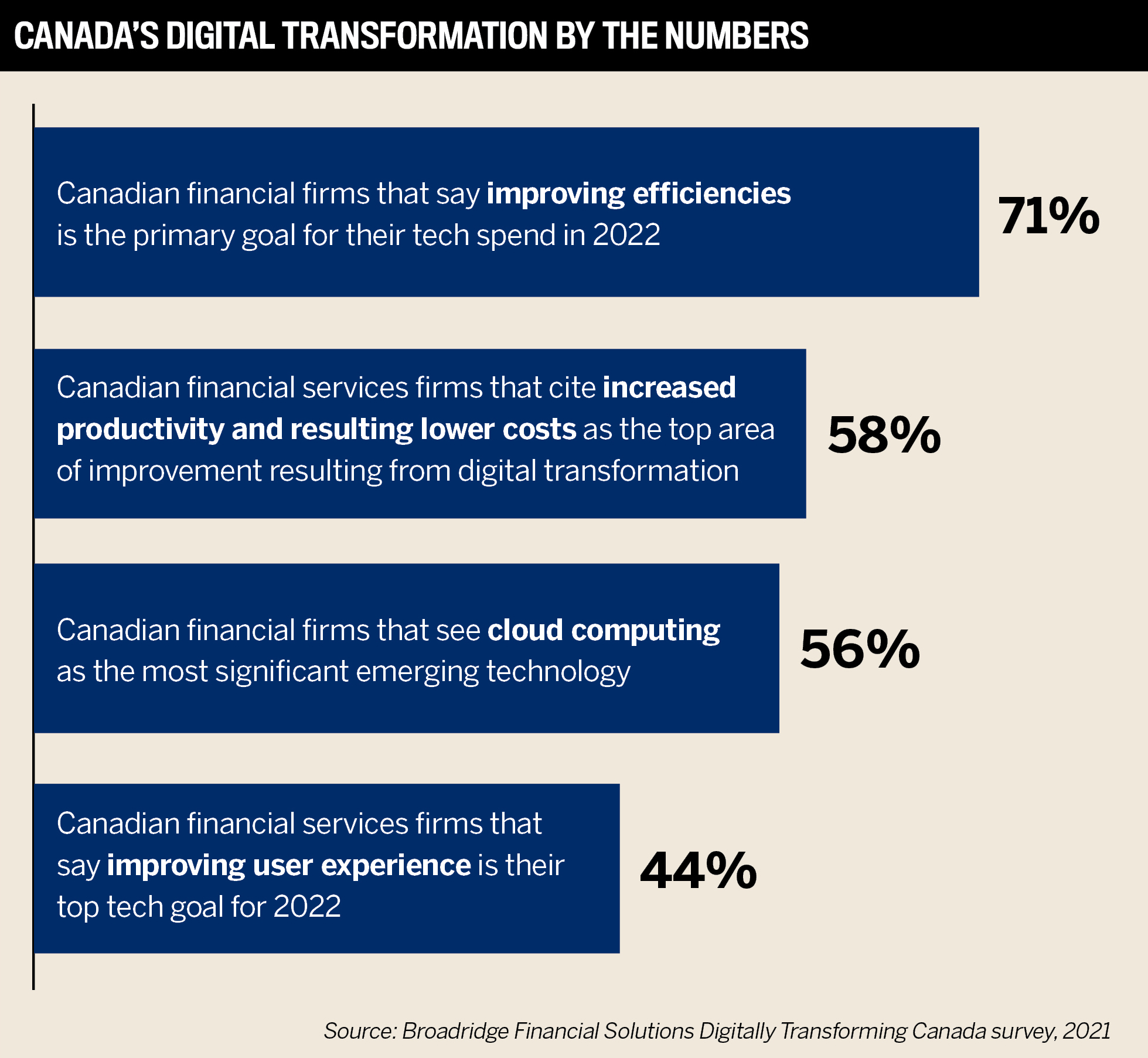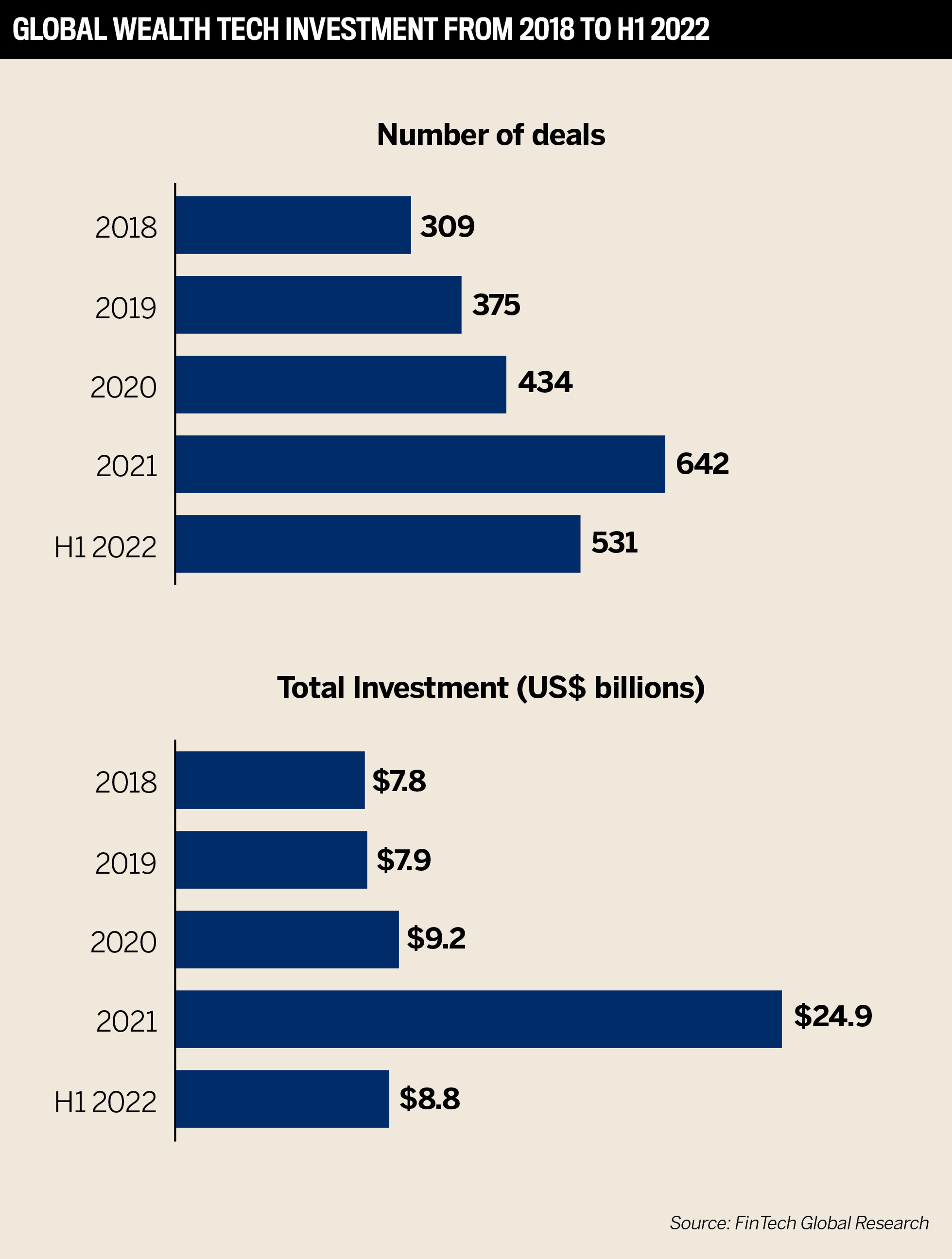

Jump to winners | Jump to methodology
Tech matters and when done correctly, it moves the needle. That’s exactly what Wealth Professional’s 5-Star Wealth Tech Providers are doing for their clients. It’s an evolving and effective synergy.
Industry expert Jason Pereira, partner and senior financial consultant at Woodgate Financial, explains, “Ask any advisor to think about the technology that they used 10 or 20 years ago, and whether they think they can compete or be as efficient in the current landscape with that technology – and the answer is no.”
“Ask any advisor to think about the technology that they used 10 or 20 years ago, and whether they think they can compete or be as efficient in the current landscape with that technology – and the answer is no”
Jason Pereira, Woodgate Financial
In its most recent outlook published in April, BlackRock projected US equities to see a 7.1% nominal return over the next decade, compared to 14.8% in the past 10 years ending in 2021. Forecasts from Morningstar Investment Management (5.8%) and Research Affiliates (6.3%) are even greyer. Translation: expect portfolio management to be considerably more challenging for the foreseeable future.
Regulatory and compliance pressures are also mounting. Within the first year of introducing a comprehensive change through its client-focused reforms, the Canadian Securities Administrators (CSA) is pressing on with the planned creation of a new single self-regulatory organization by the end of 2022. A CSA consultation on total cost reporting earlier this summer, which proposes to harmonize rules for mutual funds and segregated funds, represents another potential burden.
Advisors also need the ability to communicate digitally, remote options to conduct proficiency testing and help in succession planning, and the capability to manage documents in the cloud. Data gathered from The Tech’s Factor: the digitalization of private markets in 2022 and beyond, shows 90% of US senior executives of firms with assets under management of more than US$1 billion report technological capabilities are a top priority.
In the face of these industry challenges, WP’s 2022 winners are partnering with advisors and firms across Canada to deliver ingenious tech solutions which have a proven ability to elevate how they serve their clients.
“When robo advice came along, there was a fear that robos would take over and replace human advisors. And I think we’ve proven out now that robos can be an assistant technology”
Brad Joudrie, Conquest Planning

In the fourth annual Digitally Transforming Canada survey conducted by Broadridge Financial Solutions this year, 71% of respondents said that improving efficiencies was their primary goal for their technology spend in 2022.
“We are not a special industry. We are like any other industry in that at the end of the day, we have to worry about efficiency,” adds Pereira. As the curator of the only online map of the Canadian Fintech Landscape and host of the Fintech Impact podcast, Pereira is an established thought leader in the Canadian wealth technology space.
According to the Broadridge survey, 58% of Canadian financial services firms said the top area of improvement within their company as a result of digital transformation was “increased productivity and resulting lower costs.” One area that promises to benefit from greater productivity is financial planning and Conquest Planning, based in Manitoba, is tackling that with its artificial intelligence (AI) SAM engine.
“A very large majority of the firms that we work with have viewed AI in a very positive way to drive efficiency within their practice,” says Brad Joudrie, chief revenue officer at Conquest Planning, a 5-Star Wealth Tech Provider. “We often use the analogy of a caddy and a golfer: SAM, our AI engine, suggests strategies or scenarios that might be most effective to consider for a client’s particular situation, and ultimately, the advisor is the one to hit the shot or make the decision to execute with their client.”
Over 15,000 advisors use Conquest Planning’s tech, an impressive feat considering the company has only existed for three years. However, Joudrie admits some firms have resisted the technology, concerned it eliminates the advisor’s role.
“When robo advice came along, there was a fear that robos would take over and replace human advisors. And I think we’ve proven out now that robos can be an assistant technology,” he says. “We’re ultimately trying to empower those professionals with more efficient technology so that we can service more clients together.”
“By constantly monitoring and testing against cybersecurity threats, along with being compliant with institutional-grade security frameworks like SOC2, customers can trust that firms are guarding their customer’s data while bringing a better experience for all”
Shawn Prodgers, Mako Financial Technologies
In Broadridge’s study, 44% of Canadian financial services firms said improving user experience was the top goal in implementing new technologies in 2022. Quebec-based Mako Financial Technologies is doing just that by helping firms migrate their paper-based client onboarding processes into a digital format.
“The wealth management industry has one of the largest repositories of private and confidential data in the world. Yet, customers find themselves filling in the same information over and over again,” says Shawn Prodgers, COO and CFO of Mako. “This can lead to unavoidable errors and increase friction in the onboarding process.”
Prodgers says industry players are realizing that with proper controls and permissions, personal information can be automatically filled to reduce unnecessary repetition and improve the customer experience. This realization comes as part of a broader pandemic-driven awakening to the benefits of digital transformation.
He says, “Going paperless did not only enhance the client-advisor relationship, but also introduced other instrumental benefits like a better user experience, better compliance tracking and faster onboarding times with fewer errors.”
Raphael Bouskila, CEO of one of WP’s 5-Star Wealth Tech Providers Mako Financial Technologies, adds, “To develop custom solutions, the Mako team first listens to a firm’s unique needs before designing automated workflows to streamline them. Common use cases include digital onboarding, refreshing KYC information, subscription agreements and even bulk repapering.”

Wealth firms are moving more of their business onto the cloud. Of the financial firms surveyed by Broadridge, 56% cited cloud computing as the most significant emerging technology, driven by expectations of a continued hybrid working environment.
As more data gets stored in cyberspace, wealth firms are looking for ways to securely manage clients’ information online – and for good reason. According to PwC’s Canadian Cyber Threat Intelligence Year in Review Report: 2021, around 62% of Canadian organizations either suffered from a ransomware incident or had an attempted ransomware attack. A prominent theme across cases was the use of weak security controls in the cloud environment.
Toronto-based FutureVault, a 5-Star Wealth Tech Provider 2022, offers a platform for clients and advisors to share vital documents digitally, while still ensuring their information is protected from bad actors.
“Today’s wealth management firms require solid cybersecurity implementation to grow and prosper,” says Nevin Markwart, FutureVault’s chief information security officer. “As the essence of a wealth firm’s brand is client trust and confidence, wealth management organizations now rely on formal cybersecurity policies and procedures, with direct executive managerial oversight, to ensure that client data is safe and secure.”
Wealth management firms in Canada have to comply with the Personal Information Protection and Electronic Documents Act, federal legislation that sets out 10 fair information principles that define firms’ responsibilities with respect to information security and personal information privacy management. The Investment Industry Regulatory Organization of Canada and the Mutual Fund Dealers Association of Canada, the country’s two self-regulatory organizations for the investment industry, have also long held cybersecurity and cyber risk management as priorities for registrant firms.
“By constantly monitoring and testing against cybersecurity threats, along with being compliant with institutional-grade security frameworks like SOC2, customers can trust that firms are guarding their customer’s data while bringing a better experience for all,” adds Prodgers of Mako Financial Technologies.
The pandemic might have set off a broad acceleration of tech adoption across the wealth space, but that could be slowing: 53% of respondents to Broadridge’s survey this year graded their firms’ digital transformation efforts an “A” or a “B”, down from 66% in 2020. Global wealth tech investment trends also point to a slowdown; according to FinTech Global, wealth tech investment within the first half of 2022 stands at US$8.8 billion, putting it on track for a whole-year total of US$17.6 billion compared to US$24.9 billion for the whole of 2021.
Firms might believe they’ve done enough on the tech front, but Pereira argues they should consider technology adoption as a continuous journey. Beyond that, he urges advisors to assume a proactive mindset.
“There are technologies that are table stakes in the rest of the world, that Canadian advisors will not even consider using even though they exist in this country,” he says. “When one person says no, they’re not just saying no for themselves, but they’re also hurting the prospects of that technology proliferating in the industry. Advisors have to take a firmer hand in the running of their own practices and embrace the fact that they need to continuously improve the digital delivery of their services.”
Wealth Professional invited technology service providers from around Canada to submit nominations, detailing the problems or pain points their offering is designed to solve or relieve for wealth management professionals and how their solution differs from that offered by competitors.
The WP team objectively assessed each entry for detailed information, true innovation and proven success – along with benchmarking against the other entries – to determine the 30 5-Star Wealth Tech Providers.